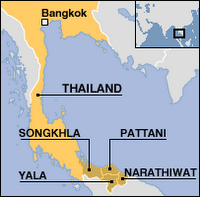- Home to Thailand's Pattani Malay Muslims minority
- Muslim rebels fought the government for decades
- Militants attacks surge since 2004, 1700 dead
- Security forces' response criticised by rights groups
Thailand's minority Malay Muslim communities based almost exclusively in the country’s southern provinces which originally were part of the Malay Kingdom of Pattani annexed in 1902. As they have been suppressed and neglected they fought Bangkok for decades for a separate state.
Thailand's Malay Muslims complain of of long oppression, discrimination and a lack of opportunities, a resentment which occasionally leads to clashes with the authorities.
Since January 2004 it has been hit by surge of insurgency which more than 1,700 people dead.
Region apart
Region apart
Thailand's Malay Muslims are largely concentrated in the southern provinces of Narathiwat, Pattani, Songkhla, Satun and Yala.
The southern provinces were originally part of an independent Malay Sultanate of Pattani which adopted Islam in the mid-13th century. Thailand annexed the region in 1902 and systematically suppressed its culture and identity.
The local inhabitants have been neglected and the areas are less prosperous than central Thailand.
The Malay Muslims, as the native inhabitants of the regions complain they are at a disadvantage compared to the non-native Thai Buddhist which was systematically transmigrated into Malay Muslim majority provinces.
That Malay Muslim living in the region is distinctively different from the rest of the Thai population. Linguistically they speak Jawi, a Malay dialect and most importantly they are Muslims, abiding byIslamic rules and restrictions.
The people living there had and still do have far more in common with their Malay neighbours in Malaysia.
Increasingly estranged and suppressed by the Bangkok government, Muslim separatists began an organised insurgency in the 1970s fighting for separation.
Thousand of the Pattani Malay Muslims left their land and became Diasporas for a better life.
The violence died down in the 1990s but surged during Thaksin’s administration in January 2004 with a raid on an army depot signalled a return to the violence. Four soldiers were killed and 400 guns, most of them M-16 rifles, were stolen from a store in Narathiwat province.
Since then there have been frequent incidents in which symbols of authority have been targeted by Muslim gunmen.
The deadliest incident happened on 28 April when hundreds of suspected Islamic militants launched a series of raids on security posts in the region.
The day ended in the massacre of more than 100 of the poorly-armed militants, and there was international concern over the degree of force used by security personnel.
Another bloody incident took place in the southern district of Takbai in October 2004. More than 80 people died after a protest turned violent, Seven were killed at the scene and 78 died in army custody from suffocation, after being brutally loaded into army trucks.
That incident clearly testified that Thaksin just like any previous Sino-Thai leader who used to butcher the Southern Malay Muslim activists.
Links to radical groups
The Thai government continues to insist that most of the attacks in the south can be attributed to local criminals.
But it seems evident that organised Islamic separatist groups are playing a part in the violence.
There are a number of Muslim separatist groups known to operate in southern Thailand - including Pulo (the Pattani United Liberation Organisation), BRN (the Barisan Revolusi Nasional) and GMIP (Gerakan Mujahadeen Islam Pattani).
Gen Sonthi, the first Muslim ever to lead the army in Buddhist-majority Thailand, may also use the coming months to try to subdue separatist insurgency by ethnic Malay Muslims in southern Thailand.
The leader of one insurgent group on Thursday welcomed the coup by Gen Sonthi, who had previously advocated peaceful dialogue to end a bloody conflict.

No comments:
Post a Comment